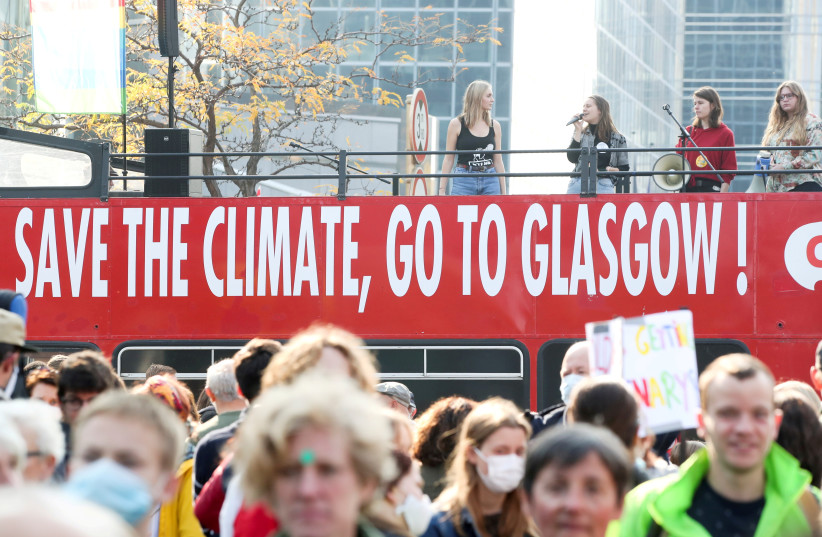The United Nations General Assembly usually gives the opportunity to do so. But this year, because of Sukkot, by the time Bennett arrived in New York, most of the leaders were gone; Also, several video-conferences were held due to the pandemic.
Bennett is starting the trial at a loss. He cannot compete with the fame of former Prime Minister Benjamin Netanyahu, who helped Israel go above its weight in such incidents, even though there are some leaders who want to encourage and support the Bibi government.
But climate change is one of the key issues on the global agenda, as seen by leaders from around the world planning to gather in Glasgow, and there is much Bennett can do that could benefit Israel.
 People take part in a climate march in Brussels, Belgium, ahead of the COP26 climate summit in Glasgow on October 10, 2021. (Credit: Reuters/Yves Hermann/File photo)
People take part in a climate march in Brussels, Belgium, ahead of the COP26 climate summit in Glasgow on October 10, 2021. (Credit: Reuters/Yves Hermann/File photo)
The National Security Council, which recently took on climate change as part of its portfolio, set four main goals for Israel: 1) to prepare as best as possible for emergencies such as wildfires, snow storms, etc.; 2) to take advantage of Israeli assets, such as innovation in climate-related areas; 3) advancing regional cooperation; 4) Reducing greenhouse-gas emissions.
These are important goals for Israel’s future domestically, but they also each have a diplomatic element.
Bennett would like to emphasize Israel’s innovation in providing solutions to the problems possibly caused by climate change, whether it be meat substitutes, desalination, desert agriculture, solar power or others, and calls for joint efforts with other countries at the conference. use them for.
The UK, the conference’s host country, is already enthusiastically watching Israeli technology in its “race to zero” carbon emissions, and it is providing support to Israeli climate-tech companies through the Clean Development Department of its UK-Israel Tech Hub. The British industry is ushering in. Tel Aviv.
But Israel lags behind many developed countries in taking steps to reduce climate change. The state controller’s report this week said the government had failed to meet its emissions targets. Israel’s emissions have increased by 12% since 2005, while the European Union has decreased by 21% over the same period. Israel has the 10th highest emissions rate in the OECD, reaching the largest number of countries.
The Allies have quietly criticized Israel for not having a comprehensive, long-term strategy on the climate. For example, Israel has not set a target date for zero emissions. And while Israel is eliminating coal because of its natural-gas resources, and the gas is cleaner than coal, it is not a renewable energy source.
The UK would like to see Israel sign the Forest and Ocean Conservation Initiative, among other steps, adopting and adopting the use of zero-emissions vehicles for public transport.
Furthermore, awareness of climate change among the public is generally much lower than in the Western world, and the government has done little to manage people’s expectations on this important issue.
The same department at the UK embassy, which is bringing Israel’s clean-tech to the UK, has also brought in sustainability experts from the UK to meet with the heads of some of Israel’s biggest companies and the movement towards green industry in the private sector. to encourage.
It is true that Israel’s footprint – carbon and others – is much smaller than that of players such as India and China, which are facing criticism for not doing enough to reduce their emissions.
But being a team player on climate will go a long way with countries that Israel sees as like-minded. In that regard, the cabinet’s decision this week to take 100 different steps towards mitigating and adapting to climate change is a positive step.
The announcement of ambitious goals would help Bennett portray himself as a statesman on one of the biggest global issues. Sticking to goals that are difficult to achieve will benefit the Israelis in the long run.